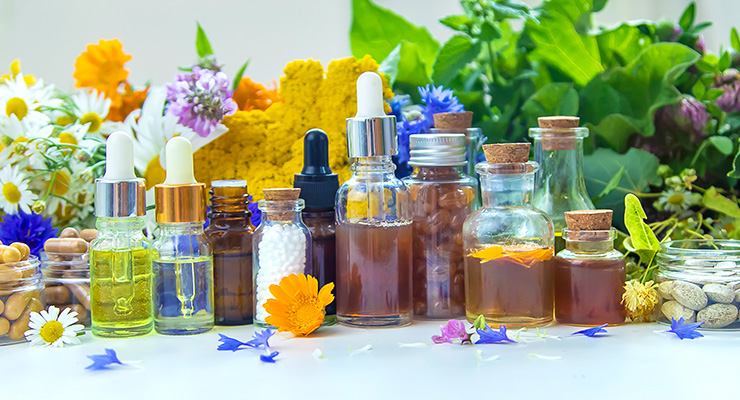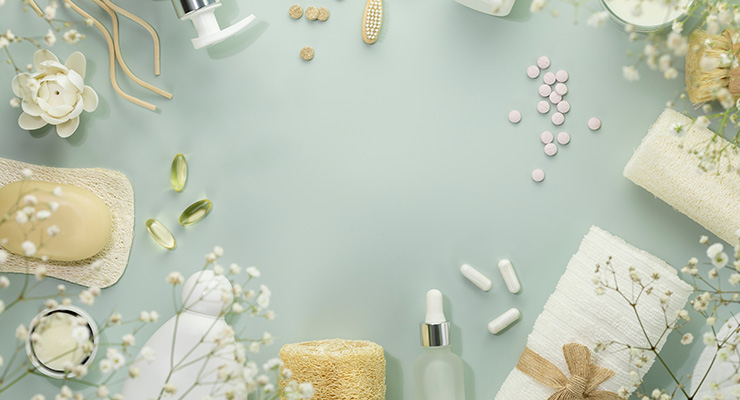Features
The Building Blocks of Beauty Supplements
Consumers are buying in, but they want efficacy, clinical support, and affordability.

By: Sean Moloughney

Dietary supplements play a significant role in the wellness routines of everyday consumers. Increasingly, people are looking for ingestible products that can improve how they feel on the inside and how they look on the outside.
Denise Herich, co-founder and managing partner of The Benchmarking Company (TBC), recently presented results from an online survey designed to explore consumers’ use of supplements, attitudes, and buying behaviors.
Fielded September to October 2022, the survey of more 2,000 U.S. female beauty buyers ages 18+ included 48 in-depth questions, including demographic questions.
Overall, for these women, the survey found supplements are an important part of their self-care routine. For example, 81% said supplements “help me stay healthier,” 61% said “I’m doing something good for myself,” 61% also said “they make me feel better,” and 51% said “They are good for my hair, skin & nails.”
The vast majority (92%) believe the best way to attain their beauty objectives is with an inside-out approach, taking supplements to complement their skin care/hair care regimen, according to Herich.
Wants and Needs
In terms of the overall health issues women are looking to address, 70% aim to meet daily vitamin/mineral needs, 60% want to promote general wellness, 43% said to boost immunity, 39% improve gut health/probiotic, 29% improve energy, 26% seasonal allergies, 26% improve digestion, and 31% improve sleep.It seems women are finding success in their routines, Herich said. The survey showed 80% of respondents reported seeing an improvement in their health and wellness as a result of taking supplements, with nearly a third (32.3%) saying the effects have happened after a couple of weeks, and another 14% saying within the first week.
In terms of the beauty needs they seek to address through supplements, 79% said hair growth/health; 65% stronger nails; 60% restore collagen/skin firming; 55% clear skin/skin health; 40% anti-aging/fine lines and wrinkles; 39% improve metabolism/weight loss; 33% skin hydration; 29% skin glow; and 29% antioxidant skin protection.
What’s most important for these beauty buyers? Affordability, efficacy, clinical claims, and consumer claims and reviews were rated highest, Herich noted.
Give Them What They Want
Beauty buyers are educated and seek out information before purchase; 63% said they read product reviews, 58% read product labels and ingredient lists, 51% research the brand online, 51% look at the concentrations of supplement ingredients, 50% look for product claims backed by consumer research, 43% look for scientific data about the ingredients, and 31% undergo vitamin deficiency testing to inform supplement needs.More than three quarters (77%) stated it is “important to very important” for supplement brands to substantiate/prove the marketing claims that are touted for a product.
Asked about ingredients, forms, and flavors for supplements, 76% of women cited vitamin D as a “must-have” ingredient; 67% said the same for vitamin C; 62% said B12; and 61% said antioxidants.
Nearly two-thirds (65%) said they prefer capsules, 52% said gummies, and 51% said tablets. Mixed berry topped consumers’ preferred flavors, followed by strawberry (46%), tropical fruit (45%), chocolate (36%), and cherry (32%).
Women also want personalized solutions for their beauty concerns. Herich recommended brands “formulate with proven ingredients that will bolster the results.”
She also advised companies to be transparent. “Provide information on your website and point of sale that provides the information she seeks. She’s looking for the 411 from her medical professionals; consider physicians and doctor’s offices as a retail partner.”
Lastly, “Leverage the halo effect from your hero products to expand into supplement add-ons,” Herich said.
Get Ready for Gen Z
Euromonitor International recently highlighted the emergence of Generation Z in its briefing “The Gen Z Beauty Consumer.”People born between 1995 and 2009 are coming of age amid significant changes since COVID-19. Faced with stress from the pandemic, the economy, social and political upheaval, and climate change, “Gen Z tends to prioritize certain values to a greater extent than other generations, especially self-expression, value for money, holistic wellness, genderless beauty, and support for social causes,” noted Olivia Stelmaszczyk, Euromonitor research analyst in an article from October 2022.
“These shifts are key to understanding this multi-faceted cohort, how these people are building their relationship with beauty, and how brands must evolve to keep up with their ever-changing needs and values,” she wrote.
According to Euromonitor’s “Voice of the Consumer: Health and Nutrition” survey, fielded January to February 2022, more than half of Gen Z respondents reported being extremely or moderately concerned about stress and anxiety, as well as depression and mental health.
“While the survey was fielded before the invasion of Ukraine, the subsequent impact of the humanitarian crisis, inflation, rising cost of living, and geopolitical changes are very likely to have added to the weight,” Stelmaszczyk wrote.
“It is no surprise that Gen Zs’ idea of beauty and personal care is becoming intertwined with emotional wellness and self-care, especially since they leaned on beauty to provide a sense of comfort or opportunity for indulgence during the pandemic. Two years later, this behavior is still holding strong. Value, price accessibility, and affordability will continue to be key factors for Gen Z beauty consumers.”
Euromonitor’s “Voice of the Consumer: Beauty” survey, fielded June to July 2022, showed that concepts such as inner confidence (44%), being comfortable in your own skin (44%), and embracing yourself (36%) carry more weight among Gen Z than other generations.
“Gen Zs’ perceptions of beauty are becoming more centered around personal expression, identity, and individualism than previous generations,” according to Stelmaszczyk. “As a social media-native and smartphone-driven generation, Gen Z tends to embrace individualistic expression, but is at the same time influenced by external opinions and outside pressures. Indeed, there is growing awareness of the negative mental health effects of adhering to conventional beauty standards, and since Gen Z consumers want to build a kinder relationship with themselves, an undercurrent of rebellion is starting to emerge.”

Making Skin & Hair Health Simple
While starting from a relatively small base, beauty supplements have seen year-to-year growth of 40% over the last 5 years (CAGR 2018-2022), according to global data from Innova Market Insights. Alongside vitamins, which make up a large share of the ingredients in beauty supplements, collagen has been a big star in the market in recent years, Innova noted.Overall, more consumers are seeking to simplify their beauty and self-care routines, noted Sébastien Bornet, vice president of global sales and marketing at Horphag Research, worldwide supplier of Pycnogenol French maritime pine bark extract.
“They want products that do more work and provide more of the benefits,” he said. “They want more efficiency with a more simple daily routine they can stick to and achieve the desired results.”
It’s not just a women’s health market either, said Bornet. “More men active in the category may also factor into this trend. Products with evidence-based ingredients that support the basic building blocks of healthy skin, including microcirculation, elasticity, hydration, and antioxidant properties, are in an exciting position. Formulas that are designed to have direct health benefits that go deeper than just healthy skin are top of mind.”
Anti-aging ingredients and formulations are alive and well, according to Matt Ruggiero, marketing manager, Nutrition21, citing a Grandview Research report that predicted women’s health and beauty supplements will generate about $70 billion in sales by 2026.
“With consumers intervening a lot earlier than those of the past, it seems the market has broadened in terms of its consumer base,” Ruggiero said. “Today it is common for consumers to seek out products that will pay longevity dividends well into their future. An example is those who want to address their appearance concerns in their 20s and 30s vs. waiting until they hit middle-age and older.”
The skin is the largest organ and often mirrors overall health and wellbeing, Bornet noted. “Nutrition plays an active role in how our skin looks, feels, and acts. Gut health is tied to our immune system. If our gut health is compromised, skin inflammation and irritation may be more evident and it may take longer for skin to recover.”
People can support skin and beauty from within by addressing other key aspects of health, he added. “Interestingly, mechanisms involved in maintaining healthy skin and hair, such as antioxidative and anti-inflammatory properties, microcirculation, and natural promotion of collagen, elastin, and hyaluronic acid are also involved in maintaining healthy circulatory health, muscle function and recovery, joint care, and cognitive functions.”
Pycnogenol not only supports skin and hair goals, he added, but also offers natural health benefits for the entire body, including cognitive, joint, and heart health.
Clinical substantiation is a huge differentiator in the beauty market, said Ruggiero. “Consumers want proof that beauty supplements will have a measurable impact on their appearance. For Nutrition21’s Lustriva ingredient, it has been clinically shown to increase hair growth by nearly 20% in as little as three weeks (Journal of Clinical & Experimental Dermatology Research, 2021).”
Lustriva is a complex that combines bonded arginine silicate with magnesium biotinate, a new form of biotin and silicon. The ingredients found in Lustriva are Generally Recognized As Safe (GRAS) allowing for various applications and innovative product formulations, Ruggiero said.
It’s also been shown to improve skin’s appearance, he added. “In a comparison to baseline, those taking 160 mg Lustriva daily for 12 weeks experienced significant improvements in skin texture, and a reduction in the appearance of fine lines and wrinkles, simply by adding Lustriva to their daily routine.”
Skin health is a growth area in the men’s health category, according to Bornet. “It was once a category occupied by women, lumped in with beauty and makeup, but that is no longer the case. Men are more concerned with their appearance than ever, and skin health is an entry point for younger men into the natural
supplement market.”
A study published in Skin Pharmacology Physiology in 2021 offers important findings for those concerned with skin health, said Bornet. “The study found Pycnogenol may help to significantly retain skin hydration, increase skin elasticity, and reinforce skin barrier function for those exposed to urban environmental pollution, as well as seasonal temperature and humidity variations. The study also found Pycnogenol to increase skin lightening during seasonal changes when dark spots can emerge.”


